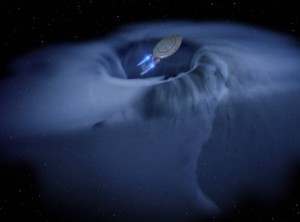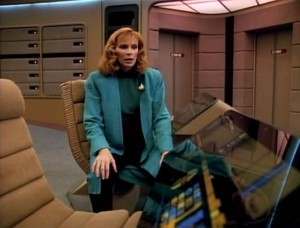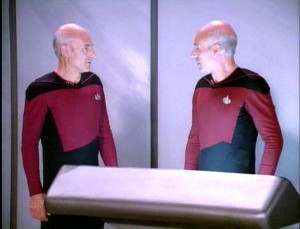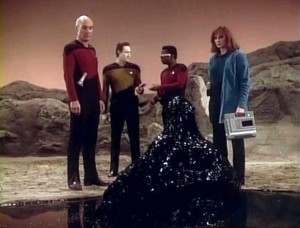
IFStar Trek: The Next Generation (1987 – 1994) did not have the words “Star” and “Trek” in the series title — or the good fortune to air on TV the year after the box office hit, Star Trek IV: The Voyage Home (1986) — it may never have survived a few awkward, early seasons and come to achieve the reputation for greatness it currently enjoys with fans and reviewers.
The conventional wisdom — which happens to be correct in this case — is that Star Trek: The Next Generation did not really hit its stride until its third season.
The early seasons of the series re-purposed plots from the classic sixties series (“The Naked Now,”) played musical chairs with the Enterprise’s CMO, failed to introduce the series’ new villain, the Ferengi, in a way that made the race of “Yankee traders” seem menacing, and traded in preachy didacticism about the perils of nationalism (“Encounter at Farpoint,”) eating meat (“Lonely Among Us,”) and recreational drug use (“Symbiosis.”)
One dreadful episode, “Code of Honor,” featured a race of primitive black-skinned humanoids, and was absolutely cringe-worthy for its commentary on race. Another equally embarrassing installment, “Angel One,” featured that old genre cliché about a world run by — gasp! — women.
But one fact to consider about conventional wisdom as it regards The Next Generation is that it largely fails to account for the fact that some of the early episodes were also, in their own peculiar way, daring and even experimental.
That doesn’t mean that the following episodes were necessarily complete successes, but rather that they tried things, and in the process attempted to push the franchise in new and ambitious directions. For that, they deserve recognition, and perhaps even a little love.
Accordingly, below you will find a list of the five most underrated episodes of Star Trek: The Next Generation.
And you’ll notice that all but one of them emerges from the series’ first two highly-uneven seasons, a period of great lows, but also some unexpected highs.

5. “Remember Me”
This fourth season installment involves Dr. Beverly Crusher (Gates McFadden) slipping into a near-identical bubble universe, but one dominated by the thought that blazed its creation: how lonely it would be to exist in a world in which all your loved ones are gone, and worse, forgotten.
This idea is “encoded” into the foundation of Crusher’s new quantum reality, and so she begins to lose all her ship-mates, a soul at a time. Worse, the ones who remain have no recollection of those now gone.
“Remember Me” highlights Dr. Crusher’s admittedly crazy hypothesis — “If there’s nothing wrong with me, there must be something wrong with the universe” — and yet she’s not wrong.
Sometimes, life feels just that paranoid, as though the cosmos has it out for us…and on a personal basis too. If thought indeed dictates and shapes reality, then Crusher has, actually, traveled to a place where that paranoia is real, and the “intelligent design” of the bubble universe is one that has pointed its finger squarely at her, and her worst fears.
There is no political or social commentary in “Remember Me,” which perhaps precludes it from achieving the highest tier of Star Trek quality, and yet there is something so universal, nightmarish, and even haunting about Crusher’s mortal dread of the universe moving on beyond those she cares about that “Remember Me” emerges as surprisingly human.
Dr. Crusher didn’t get many good episodes in which she was a central character, and “Remember Me” reveals the doctor at her most empathetic, a quality we always hear about since she is a doctor, but don’t always really get to see played out in simple human terms. Here, we see both her steely resolve and her inner fear about losing the people she loves most.

4. “Time Squared”
This strange second season episode is essentially an ode to anti-sense, though not, necessarily, nonsense.
The Enterprise intercepts a shuttle with one passenger aboard: a dazed and confused Captain Picard (Patrick Stewart) hailing from a mere six hours in the future. In fact, he is the sole survivor of a disaster in which the Enterprise is destroyed. Before the day is out, the starship will perish inside an inexplicable and perhaps even living space vortex.
Now, the “present” Captain Picard must face his confused “future” self, and prevent his starship’s rendezvous with a terrible destiny.
Unlike many Next Generation episodes — which in the final analysis resort to techno-babble — no real explanation is ever provided for the bizarre events of “Time Squared.”
Why do the shuttle’s power systems — which have traveled back in time — operate on “reverse” principles? What is the space vortex and what does it want?
Why has it singled out Captain Picard for such torture?
In the end, Captain Picard and the other crew members must satisfy themselves that they survived the experience, and that they will never have the answers they seek. This notion is, perhaps, heretical to typical Star Trek philosophy, which establishes that all problems can be resolved through science or diplomacy, and that man can conquer the stars.
But with its absolute, determined paucity of answers, “Time Squared” gives the series a kick in the characters’ complacency. There are still things in the cosmos they can’t explain; forces of nature not yet fully quantified or understood, and in space, they will have to endure and encounter them.
“They say if you travel far enough, you will eventually meet yourself,” quips Picard about this experience. And this episode is no more and no less than an exploration of that concept, allowing Picard to gaze at himself in a mirror. He doesn’t necessarily like what he sees: a rigid, confused men set on a course of action, right or wrong.
Also, “Time Squared” generates significant suspense because the time travel window — six hours — is such a narrow window in which to escape catastrophe.

3. “The Royale”
Even the writer of “The Royale,” Tracy Torme apparently despises it. And this episode gets listed all the time on “ten worst” lists on the Net, too.
And yet, like “Time Squared,” “The Royale” is all about the very things that Picard’s crew doesn’t know, not the things that it does. In a realm as vast as the galaxy, it makes sense that every now and then the Enterprise and its crew should countenance something truly alien or inexplicable, and that is definitely the vibe underlining “The Royale.”
In this story, the Enterprise unexpectedly discovers a 20th century casino/hotel on the surface of an inhospitable planet. An Away Team beams down to investigate and becomes trapped in what is essence a bad, dime store gangster novel set in that hotel.
As the Away Team learns, a human astronaut died because of accidental alien contact, and the aliens — feeling guilty — made this hotel as a shrine, believing that the dime store novel they found on the astronaut’s ship was some important aspect of his life and belief system.
“In our arrogance, we feel we’re so advanced,” Picard states in “The Royale,” and that’s the “theorem” of this particular episode. The crew encounters an alien monument that seems to make no sense because it is based entirely on a limited, alien understanding of our culture.
This is one strange corner of the universe, simultaneously funny, scary, and sad. And the episode ably suggests that not all “first contacts” go smoothly, or as expected.
An idea is also carried over from “A Piece of the Action” on the Original Series: that no one book should be used as a model for an entire culture; that no single tome should be taken literally as the guide to life.
This idea plays as pointed commentary and critique of people who interpret the Bible or any religious text literally. Meaning that the Earth is only 6,000 years old and Jesus rode dinosaurs around the streets of the Roman Empire.
The wonders and terrors of the universe can’t be contained between the covers of one — any — book. And mankind should stop trying to put existence into such little boxes.
For all its abundant silliness, “The Royale” expresses that idea beautifully.

2. “11001001”
This early first season episode of Star Trek: The Next Generation doesn’t make many top ten lists, for certain.
Yet the episode achieves what the medium of television often does best: it fosters a sense of intimacy and connection to a particular character.
“The InnerLight” is an episode that accomplishes that task for Picard, and on a much stronger basis. But this episode achieves the same brand of connection between audiences and Riker (Jonathan Frakes). I remember early on while watching TNG with my sister, she asked me: what happens if someone falls in love on the Holodeck?
“11001001” answers that question because it concerns Riker’s unexpected romance with Minuet (Carolyn McCormick), an enhanced hologram that was meant merely to distract his attention, but who, finally, becomes “human” as we understand that term.
Considering the fact that hologram sentience and rights become a key issue in the Star Trek franchise by the era of Voyager (1995 – 2001), “11001001” is thus, after a fashion, a key episode of the mythos.
“11001001” is all about the way that life invariably connects to life.
Specifically the episode involves aliens, Bynars, who are connected to one another by computer interface. For humans, such connection is much more hit and miss and we see that fact played out not only in Riker’s friendship with the crew here in the early sections of the episode — as he seeks to alleviate his loneliness — but in terms of his relationship with Minuet.
She understands him — she is built to understand him, essentially — and that connection is more important to him than the fact that she happens to a hologram. Riker and Minuet share a love that is different, and unconventional, but — exactly like interracial or same sex relationships in our own history — the basic fact is that you love you who love…no matter if they are male, female, black, white, Klingon or hologram.

1. “Skin of Evil.”
Although I deeply admire the Star Trek ideal of peacefully broaching contact with alien life forms, the very heart of good drama remains conflict.
In Star Trek: The Next Generation’s first season, the Enterprise crew encountered aliens who wanted to debate Chinese philosophy (Portal, in “The Last Outpost”), or worked matters out peaceably with other races (“Home Soil,” “Encounter at Farpoint.”)
Some episodes even featured no overt “alien” conflict at all, but played instead as standard soap operas set in an idealistic future (“Coming of Age.”) In the early days, the series sometimes felt perilously like a space adventure with no adventure at all.
This “safe” approach was altered radically with “Skin of Evil” as the crew encounters an absolutely implacable foe: a malevolent talking oil slick called Armus.
Armus could not be reasoned with.
You could not appease him by “asking” what he wanted and then “mediating” a way to give it to him.
On the contrary, he was a creature- who existed only to oppose, obstruct, and negate.
On a program that so often involves soft ball alien interaction, Armus decidedly plays hard ball. Specifically, he kills a series regular, Security Chief Tasha Yar (Denise Crobsy) for no significant reason.
Killing Tasha as he does is brutal, nasty and unmotivated, but the savage act reminds our stalwart crew that not everyone in the galaxy thinks in the same way as they do.
And this fact, I submit, brings out the steel in their spines, and makes the characters actually reconsider and re-evaluate their noble beliefs.
In particular, Data (Brent Spiner) refuses to help Armus taunt Geordi, and then concludes that Armus should be destroyed. Armus scoffs at this “moral judgment” from a machine, but the matter is of great import. Data — an apparently emotionless being — wants to murder Armus!
By killing Tasha and mocking Geordi, Armus has made Data reconsider Starfleet’s core belief, that all creatures have the right to exist.
This is an incredibly powerful moment for Data and for the series itself. A big complaint about Star Trek: The Next Generation is that the characters can afford to be magnanimous and noble because they live in a paradise, one where they are the most powerful folks on the block. Their Federation has no poverty, and no hunger. But in this case, however, Data is not insulated by the paradise of the UFP, and must put those morals to the test in practice.
In an instant — when his friends are hurt – Data abandons noble principle for an expression of blood-thirsty vengeance… actually advocating murder.
Is that all it takes for “evolved” Starfleet officers to back off of high-minded ideals? A brush with something truly different, and truly dangerous?
“Skin of Evil” is also refreshingly free of techno-babble. Any alien, any phenomenon — anything at all on the series –could be justified, explained, and ultimately defeated by the mealy-mouthed, nonsensical tech-talk that writers forced the cast to endure.
“Skin of Evil” sidesteps this dramatic plague and instead forges a chilling sense of mystery about Armus. As Data reports, the alien has “no proteins known to us, no circulatory system, no musculature, and no skeletal framework.”
And yet…it lives.
Star Trek is supposed to be about the investigation of alien life forms, and Armus, at the very least, is not the routinely-seen bumpy-headed humanoid. There’s a genuine sense of alien menace — and difference — about this being. In short, the crew really deals with something unknown and horrifying in “Skin of Evil” And so one must appreciate that dedicated sense of ambition; that imagination to go beyond the conventional and the familiar.
And “Skin of Evil” is pretty scary too. There are some memorable compositions of Riker’s tortured visage, subsumed inside Armus, and terrifying views of the alien rising from a pool of black bile, looming over the crewmen in the screen frame and appearing truly illimitable. Perhaps there are too many shots like this, but the damatic risk-tasking that’s on display here is practically staggering; the concerted effort to show audiences something it had not seen before.
Some fans insist that Tasha deserved a better death.
I don’t think one could be conjured, frankly.
Skin of Evil” reveals to the crew of the starship Enterprise that its peaceful, conciliatory approach to encountering aliens won’t always work. Space can be a frightening and strange place, and by her very death, Tasha and Armus teach them that lesson.
Would you like to support Flashbak?
Please consider making a donation to our site. We don't want to rely on ads to bring you the best of visual culture. You can also support us by signing up to our Mailing List. And you can also follow us on Facebook, Instagram and Twitter. For great art and culture delivered to your door, visit our shop.










